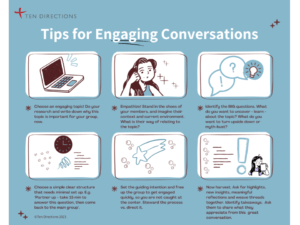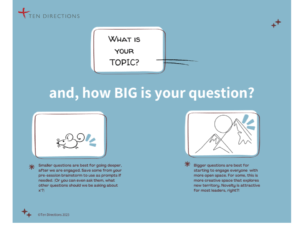As CEOs, business leaders, consultants, coaches, entrepreneurs – we have lots of ideas about relevant “topics” to bring up in our group meetings. However, HOW you introduce and talk about topics is often a powerful determinant of whether the experience is an engaging one – or falls flat.
Some meetings and conversations feel more like a cocktail party, with conversations flowing freely, topics shared with interest, and the start and end seem to naturally arise. Other group meetings can have a different feel. Perhaps the subject matter is irrelevant to some, or one voice dominates with minimal cross engagement. There is ‘no escape’ – folks disengage, some are silenced, and side-conversations start up willy-nilly or after the meeting in back-channels.
I think we all yearn for more lively, memorable conversations in groups of our peers.
The solution lies in effective facilitation. Simply put, facilitation includes setting the scene and structure for the conversation, as well as guiding the group dynamically through the process.
Here are a few markers of the journey to engaging conversations that foster cooperation and challenge for growth, and generate new insights and ideas; along with a few questions for you to reflect on to improve your facilitative leadership in practice.

Understand the Power of Engaging Conversations
Engaging conversations are not just about sharing ideas; they are the fertile ground for sprouting personal insights, innovation and are key to strengthening bonds in peer advisory groups. Engaging conversations:
- Help break the silos (due to different industry / verticals, and particular business experience)
- Help us span differences,
- Foster better understanding among group members, and
- Stimulate creative thinking.
Some clarifying questions for your reflection and learning:
- What was the last really engaging conversation you experienced?
- What was it like?
- Overall, what was most important – the process or the outcome or the relationships? Or something else?
- What was surprising or delightful about the conversation?
- What outcomes are most important to you?
Translate your topic into something folks will dive into
Have you had the experience where a new topic is introduced, only for it to fall flat? I have. 😉
Even if the topic is something everyone in the group can relate to, you need a few key ingredients to make it compelling and attract interest. Here are a few tips:
Make it relatable and relevant
Empathize with your group members and their context, and how they feel about this issue. Ask yourself (or even the group members, directly) what is at stake that makes it motivating for them to talk about this? Naming a topic is not the same as providing a context, conflict, or dilemma for everyone to chew on together. Is there a story that brings this to life?
Consider the north star intention – Why is the conversation happening? (Or, why are we having this conversation?)
- What makes the topic exciting and relevant to you and your group?
- How will it contribute to the group in a new or impactful way?
- What is your intention for this conversation, and how does it fit into the overall agenda?
Is the desired outcome to…
- Create awareness and personal discovery?
- Explore crucial new territory?
- Stimulate innovative approaches?
- Build more safety, inclusion and strengthen our relationships?
- Challenge old ways of thinking?
- Something else?

Frame the topic via questions – as opposed to top-down ‘expertise’ or ‘teaching’.
Here’s the thing – when you start off with an expert view, it tends to stifle or limit new ways of seeing and understanding, because it leads with a particular ‘conceptual frame’.
When you do that, people are more likely to respond with critical thinking, placing their awareness on whether they agree or disagree with your premise. Can you see the binary it creates? I align with what you say, or I diverge…right or wrong, black or white. When I first moved into learning facilitation skills, this was my first big mistake and a big a-ha that has greatly informed my practice.
This approach is fine IF this is your intention, (and there are times when this might be legitimate, but I encourage you to avoid this as your default mode of engaging.) However, there is another shorter route to full engagement and consciously facilitating a wider range of creative possibilities.
Use inquiry to open up new ways of looking at things, from the start. Dig into the topic in advance, brainstorm ideas related to the topic that open up valuable perspectives and start to frame up interesting questions. Then, step back and ask which of these questions or combinations or questions point to the really meaty BIG questions that could prime the conversation.

Consider this contrast:
- Smaller question: How do each of you do management reviews in your company? What makes it work well?
- Bigger question: In what ways do management reviews hold us back from cultivating greater responsibility in our people? What polarities are at play?
It is not only about the question – your way of being has an impact as well. Try to model being in a ‘mode of inquiry with a spirit of curiosity’, rather than ‘being in your expertise’ . When you can master this, you are going to be better able to avoid prematurely driving towards a right answer.
Learn to ask great questions in your meetings, with your friends and with your family. When the big question(s) is clear, you can then choose a group structure or ‘form’ that will support creating that outcome. I’ll address some of these choices in a future blog post.
Your ongoing practice accelerates your journey.
With effective facilitation, you can turn every meeting into a memorable, impactful experience.
Engaging conversations can significantly enhance peer-to-peer learning and help groups thrive. A masterful facilitator can ignite such engaging conversations, ensuring every voice is heard and valued. You help maintain the meeting’s flow, build upon ideas, support members’ breakthroughs, and guide the group towards constructive outcomes. And, as you do so, you ensure that you are not the center of the conversation, but a guide at the side to keep things flowing.
Your journey to more facilitative mastery will be much more enjoyable and impactful if you develop the essential facilitation skills, such as learning how to:
- Provide clear instructions,
- Ask great engaging questions,
- Set a container, structure and form for the conversation (or meeting), and
- Support people to be and stay connected throughout the process.
For now, I hope these tips serve as a guide, helping you facilitate an enriching experience for each of your group members and the group as a whole.
With these considerations in mind, the next step is to apply these strategies in your upcoming meetings. Remember, the goal is to ensure that each person contributes and takes away something valuable for them – be it new ideas, fresh perspectives, a personal challenge, or even some homework!
Make these changes today, practice these facilitative leadership skills and watch your group meetings transform.
And please reach out to let me know how it goes, and feel free to share this in your network.



